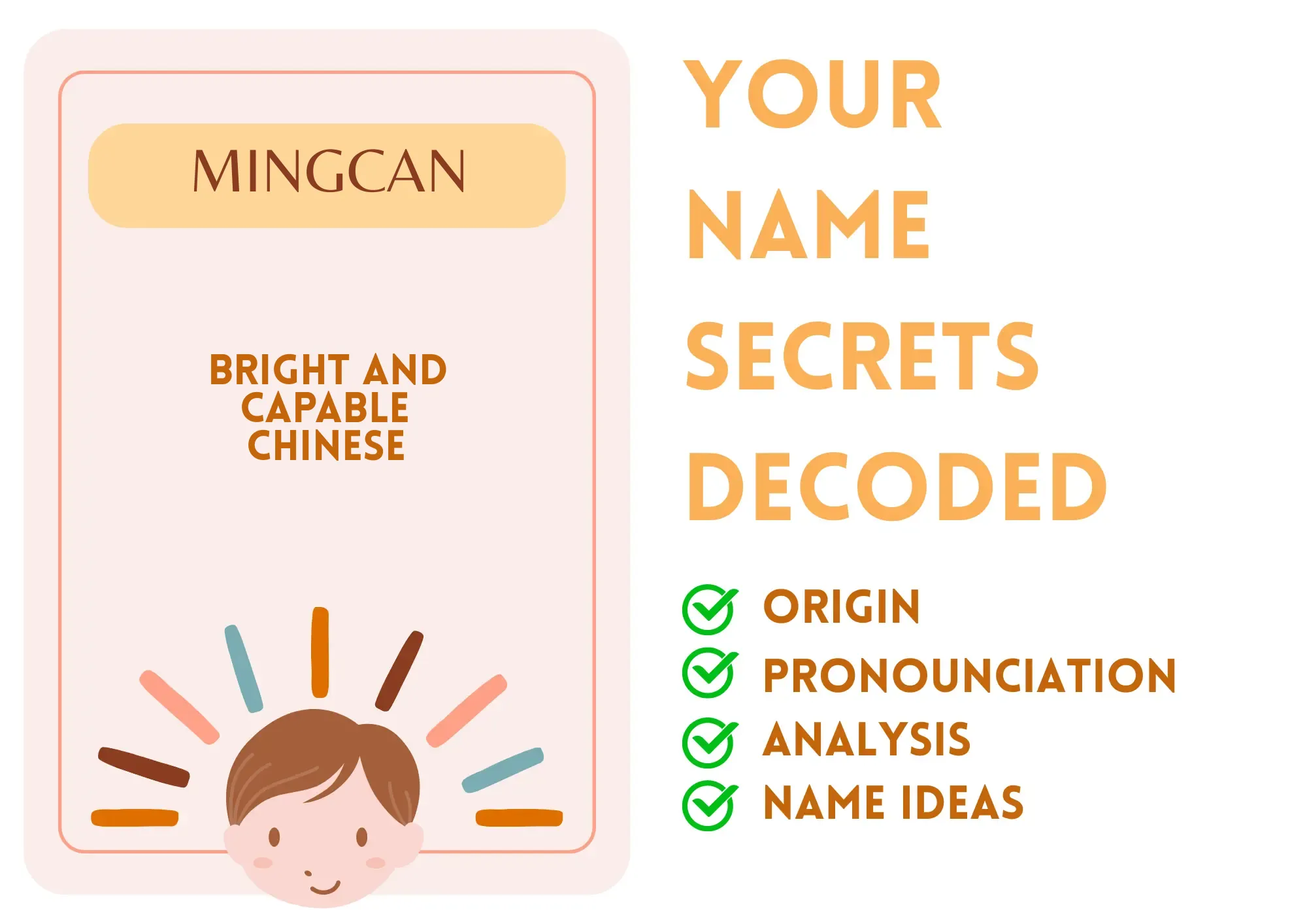
Mingcan
Mingcan is a unique name with Chinese origins that combines distinctive elements of both meaning and phonetic appeal. The name can be translated to mean 'bright' (明, 'ming') and 'can' or 'able' (can, 能, 'neng') in certain contexts, suggesting a sense of capability, intelligence, and brightness.
Primarily used for males, Mingcan reflects cultural values emphasizing intelligence and capability. The name is appreciated for its positive connotation and is often chosen in Chinese-speaking communities.
Mingcan is generally well-received, evoking feelings of optimism, intelligence, and positivity. It is relatively easy to pronounce once the tonal aspects are mastered, and the composition lends itself to common nicknames and derivatives that enhance familiarity.
Basic Information
Gender: Boy
Sounds Like: MING-tsan
Pronunciation Explanation: The first syllable 'MING' rhymes with 'sing', while the second syllable 'can' is pronounced like 'tzan' in Mandarin.
Summary and Meaning
Meaning: bright and capable (Chinese)
Origin: Mingcan has its roots in Chinese language and culture, often used across various regions where Mandarin or Cantonese is spoken.
Usage: Mingcan is traditionally seen as a masculine name within Chinese cultures.
Name Number (Chaldean)
Name Number (Pythagorean)
Popularity (Global Rank)
Overall: 326486
Boys: 72681
Most Popular in
Religious and Cultural Significance
Religion: Buddhism
Background: In a broader cultural context, names like Mingcan are sometimes associated with Buddhist teachings, emphasizing wisdom and enlightenment.
Cultural Significance: Mingcan is significant in Chinese culture due to its favorable meanings, reflecting aspirations for a bright and capable life.
Historical Significance: Historically, names like Mingcan have been valued among intellectuals and scholars in Chinese society, embodying the aspirations of families for their sons to be knowledgeable and capable.
Popular Culture
Literature and Mythology: Mingcan may appear in Chinese fiction and stories, often linked to characters with wisdom or capable leaders.
Movies and Television: While there may not be notable mainstream characters named Mingcan, variations of the name appear in Chinese dramas portraying bright protagonists.
Feelings and Perceptions
Perception: Generally, Mingcan is viewed positively, symbolizing intelligence and capability. It is seen as unique and strong, inferring a positive outlook on life.
Positive Feelings: Distinctive, intelligent, optimistic, encouraging.
Negative Feelings: Some may find pronunciation challenging without prior exposure to tonal languages.
Practical Considerations
Ease of Writing and Calling: Mingcan is moderately easy to write and has a phonetic structure that can be optimized with practice. In English transliteration, it consists of two syllables, making it manageable for most speakers.
Common Typos and Misspellings: Mincan,Mingcanne,Mingcanh,Mingcān
Common Nicknames: Ming,Can,Minnie
Mingcan Popularity
Mingcan Usage and Popularity By Country
| Country | Rank (Overall) |
|---|---|
| South Korea | 7517 |
| Singapore | 33073 |
| Thailand | 60600 |
| United Kingdom | 90588 |
| United States | 148301 |
| Canada | 149654 |
| France | 158953 |
Mingcan Usage and Popularity By City
| City | Rank (Overall) |
|---|---|
| Shanghai | 8799 |
Compatibility Analysis
Famous Persons Named Mingcan
No results found for Mingcan.
Related Names
Similar Sounding Names:
Ming,Minh,Mingyi,Minghao
Similar Meaning and Related Names:
Sibling Name Ideas (Brothers):
Sibling Name Ideas (Sisters):
Huan 
None specific
Jing 
No specific religious association
